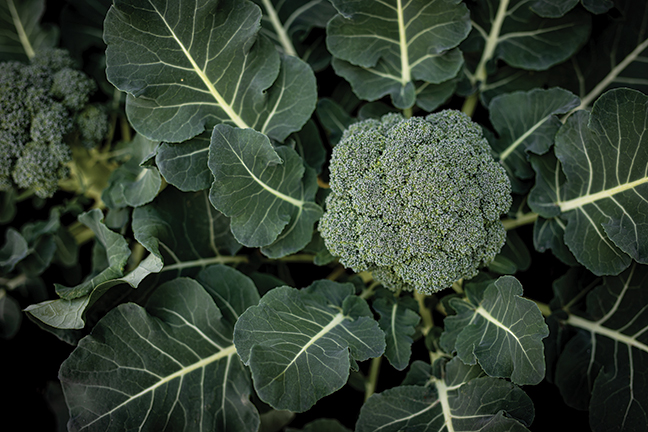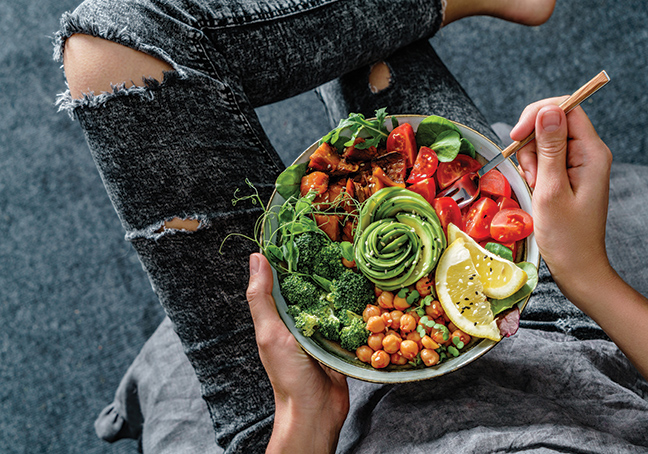BY TRACY McCUBBIN MD ABOIM, ABEM
October is breast cancer awareness month. Did you know that one in eight women will be diagnosed with breast cancer during her lifetime? And the incidence has been increasing over the last decade. Breast cancer has truly become a chronic disease. There are over 30 million women living with a breast cancer diagnosis. And, as is the case with so many chronic diseases, breast cancer can be prevented. Broccoli and cruciferous vegetables are just one of many options to aid in prevention!
So, the answer is yes! Broccoli can help detoxify the body and research shows that it can reduce the risk of breast and prostate cancer. Indoles and isothiocyanates are phytochemicals that give broccoli these superpowers. In particular, indole-3-carbinol helps the liver metabolize estrogen more effectively and is protective against hormone dependent cancers like breast and prostate.
Research from the University of Illinois found that broccoli’s anti-cancer properties could be boosted even further when the veggie is paired with spicy foods that contain the enzyme myrosinase such as horseradish, mustard or wasabi. And it is not just broccoli but all its siblings in the cruciferous vegetable family: cauliflower, arugula, Brussel sprouts, kale and cabbage to name a few.
Breast health is much more than a mammogram every 1-2 years. While mammography is an invaluable tool for early detection, we know there is more to be done. Toxins are produced by women as the liver metabolizes estrogen. These toxins are significant contributors to the development of breast cancer. This is where the cruciferous vegetables come into play.
When we make a hormone, we have to use it, then move it out. Estrogen methylation is a critical step in the protective mechanism of estrogen metabolism. Optimal methylation can only occur with a diverse microbiome, optimal gut health, understanding of genetic single nucleotide polymorphisms (SNPs) and minimizing nutrient deficiencies.
 Methylation SNP’s like Catechol-O-Methyltransferase (COMT) is important to know about if you are at risk for breast cancer. COMT is a key enzyme involved in the deactivation of catechol estrogens. If you have reduced activity of this enzyme, you may have trouble clearing your estrogens and it is important to support this enzyme with adequate B vitamins and magnesium.
Methylation SNP’s like Catechol-O-Methyltransferase (COMT) is important to know about if you are at risk for breast cancer. COMT is a key enzyme involved in the deactivation of catechol estrogens. If you have reduced activity of this enzyme, you may have trouble clearing your estrogens and it is important to support this enzyme with adequate B vitamins and magnesium.
Having a daily bowel movement is important. In the words of Bethany Hayes MD, you have to take out the trash every day! Otherwise, you risk the deconjugation of the estrogen molecule and it will be recirculated in the body. This puts extra work on the liver to detoxify it a second time.
What are some other ways to prevent breast cancer?
Exercise regularly. A Meta-analysis of 34 case control and 28 cohort studies showed an overall 25% decreased risk of breast cancer with regular exercise.
In addition, lifetime exercisers had the most benefit. Find something you love to do – whether it’s hiking, cycling or dancing and practice often. Your body and mind will thank you.
Include a fair amount of Omega 3 Fatty Acids in your diet. High levels of dietary omega 3 FA from fish/shellfish were significantly associated with a decreased risk of breast cancer. Foods high in Omega 3 are wild caught salmon, walnuts and flaxseed. Whole flaxseeds will stay in the refrigerator for 1 year. I recommend grinding the seeds a few tablespoons at a time and storing these in the refrigerator. They will stay fresh for 2 weeks. Sprinkle a teaspoon or two over oatmeal or salads. Flaxseed has a nutty flavor. You can bake it in zucchini bread or put some in your pancake batter. It is great in smoothies, too!
Supplement your Vitamin D. Vitamin D is the Sunshine vitamin. Even in sunny Colorado, it can be challenging to absorb sufficient levels year round. We make it in our skin. An SPF of 7 or higher will block that conversion. Since many of us use sunscreen regularly, our vitamin D levels can be quite low. Lower serum Vitamin D levels were related to increased risk of breast cancer in white females. Since sunscreen is important to keep our skin safe, we need to boost our natural Vitamin D with supplements. I recommend getting your levels checked every few years and maintain your Vitamin D level at 40 or above.
Limit your alcohol intake. Alcohol increases the risk of breast cancer. Even one drink per day is associated with a 20% increased risk so be careful of your choices. To start reducing your alcohol intake try taking a break for a week, limiting yourself to 1 -2 drinks on the weekends or make a fun mocktail recipe to keep the spirit alive.
In addition, there are toxic estrogens in the environment that can contribute to breast cancer. It is estimated that when a woman leaves her house in the morning, she is wearing up to 122 different chemicals! Many of these are endocrine disruptors and can increase her risk of breast cancer. Check out the Environmental Working Group’s Skin Deep (ewg.org/skindeep/) for more information on safe “lotions and potions.” This database provides safety ratings for personal products and cosmetics with a breakdown of the chemicals used and their concerns. Being mindful of what is going on your body is just as important as what you are putting in your body.
Dr. McCubbin has 30 years of clinical experience. This is a subject near and dear to her heart since she helped her sister-in-law, a pediatric allergist, go through this 10 years ago. She was diagnosed with Stage 2 while 6 months pregnant with her third child. Happy to report, she is fully recovered and thriving. We would love to help you as well. Check out our website, radiancefunctionalmedicine.com or call our office for more information 303-333-1668.

